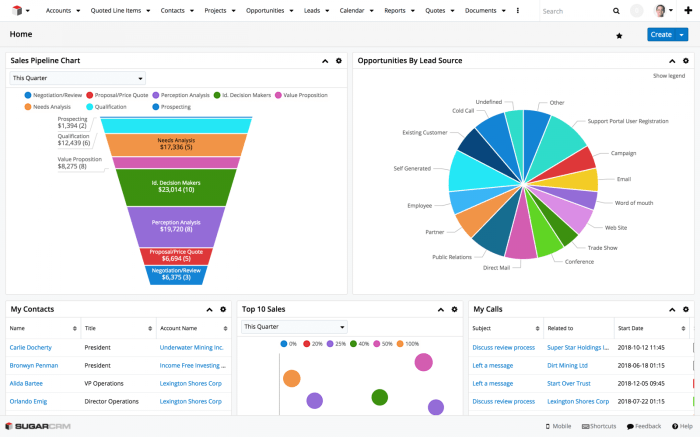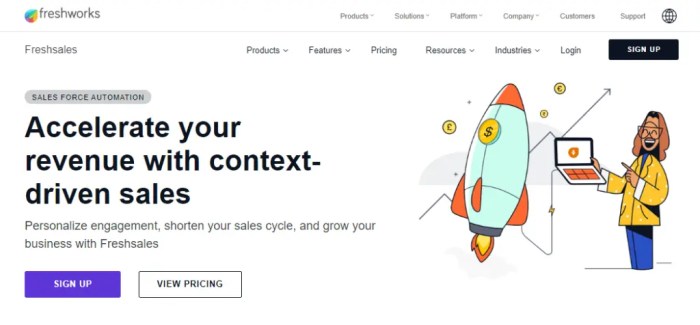Best crm software for large business – Choosing the right Customer Relationship Management (CRM) software is crucial for large businesses. A robust CRM system streamlines operations, improves customer interactions, and ultimately drives revenue growth. However, with a plethora of options available, selecting the best fit can feel overwhelming. This detailed guide explores the key features to consider, compares leading CRM solutions, and helps you navigate the selection process for your large enterprise.
Understanding the Needs of Large Businesses
Large businesses have unique CRM requirements that differ significantly from smaller enterprises. Scalability, integration capabilities, advanced analytics, and robust security are paramount. A system must handle vast amounts of data, support a large sales and customer service team, and seamlessly integrate with existing enterprise resource planning (ERP) systems and other business applications. Furthermore, robust reporting and data visualization capabilities are essential for strategic decision-making at the executive level.
Consider these key factors:
Key Considerations for Large Business CRM Selection:
- Scalability: The CRM must easily accommodate growth in users, data volume, and functionalities without performance degradation.
- Integration: Seamless integration with existing systems like ERP, marketing automation, and e-commerce platforms is vital for data consistency and efficiency.
- Security: Robust security features, including access controls, data encryption, and compliance with industry regulations (e.g., GDPR, CCPA), are non-negotiable.
- Customization: The ability to tailor the CRM to specific business processes and workflows is crucial for optimal efficiency.
- Advanced Analytics & Reporting: Sophisticated reporting and analytics tools provide valuable insights into customer behavior, sales performance, and marketing effectiveness.
- User Adoption & Training: A user-friendly interface and comprehensive training programs are crucial for maximizing user adoption and minimizing disruption.
- Support & Maintenance: Reliable customer support and ongoing maintenance are essential to ensure smooth operation and minimize downtime.
- Deployment Options: Consider cloud-based, on-premise, or hybrid deployment options based on your IT infrastructure and security requirements.
Top CRM Software for Large Businesses
Several leading CRM platforms cater specifically to the needs of large enterprises. Each offers a unique set of features and benefits. Here’s a comparison of some of the top contenders:
Salesforce Sales Cloud:
Salesforce is a market leader, renowned for its scalability, customization options, and extensive app ecosystem. Its Sales Cloud offers robust features for sales force automation, lead management, opportunity tracking, and forecasting. It integrates seamlessly with other Salesforce products and third-party applications. However, it can be expensive and require significant implementation time and expertise.
Microsoft Dynamics 365:
Microsoft Dynamics 365 provides a comprehensive suite of CRM and ERP solutions deeply integrated with the Microsoft ecosystem. It offers excellent scalability, robust security, and strong integration with Office 365. Its user-friendly interface and familiar Microsoft environment make it relatively easy to adopt. However, customization might require specialized skills.
SAP CRM:
SAP CRM is a powerful solution ideal for large enterprises with complex business processes. It excels in integrating with other SAP applications, offering a holistic view of customer interactions across various departments. Its strength lies in its ability to handle large volumes of data and complex workflows. However, it’s known for its high cost and complexity.
Oracle Siebel CRM:, Best crm software for large business
Oracle Siebel CRM is a mature and robust platform known for its stability and scalability. It offers comprehensive features for customer service, sales, and marketing. Its strength lies in its ability to handle large and complex organizations. However, it can be challenging to implement and maintain, and its interface may not be as intuitive as other options.
HubSpot CRM:
While primarily known for its marketing features, HubSpot also offers a robust CRM platform suitable for large businesses. Its strength lies in its ease of use, affordability (compared to other enterprise solutions), and strong marketing automation capabilities. However, its scalability might be a concern for extremely large organizations with exceptionally high data volumes.
Choosing the Right CRM: A Step-by-Step Approach
Selecting the optimal CRM requires a methodical approach. Here’s a step-by-step guide:
- Define your requirements: Clearly articulate your business needs, including functionalities, scalability, integration requirements, and budget constraints.
- Assess your current IT infrastructure: Evaluate your existing systems and their compatibility with potential CRM solutions.
- Research and shortlist potential vendors: Identify CRM vendors that align with your requirements and budget.
- Request demos and trials: Test the shortlisted CRMs to assess their usability, features, and integration capabilities.
- Evaluate vendor support and implementation services: Ensure the vendor provides adequate support and resources for implementation and ongoing maintenance.
- Consider long-term costs: Factor in licensing fees, implementation costs, training, and ongoing maintenance expenses.
- Make your decision: Select the CRM that best meets your needs, budget, and long-term goals.
Frequently Asked Questions (FAQ)
- Q: What is the average cost of CRM software for large businesses? A: The cost varies significantly depending on the vendor, features, number of users, and implementation complexity. Expect to invest a substantial amount, ranging from tens of thousands to hundreds of thousands of dollars annually.
- Q: How long does it take to implement a CRM for a large business? A: Implementation timeframes vary depending on the complexity of the system and the organization’s size. It can range from several months to over a year.
- Q: What are the key performance indicators (KPIs) for measuring CRM success? A: Key KPIs include customer acquisition cost (CAC), customer lifetime value (CLTV), sales conversion rates, customer satisfaction (CSAT), and Net Promoter Score (NPS).
- Q: How can I ensure user adoption of the new CRM system? A: Provide comprehensive training, involve users in the selection and implementation process, and offer ongoing support and feedback mechanisms.
- Q: What are the risks associated with choosing the wrong CRM? A: Choosing the wrong CRM can lead to decreased productivity, data silos, poor customer service, and ultimately, lost revenue.
Conclusion: Best Crm Software For Large Business
Selecting the right CRM is a critical decision for large businesses. By carefully considering your specific needs, thoroughly evaluating potential solutions, and following a structured implementation process, you can ensure that your chosen CRM empowers your teams, improves customer relationships, and drives significant business growth. Remember to prioritize scalability, integration, security, and user adoption to maximize your return on investment.
References
Call to Action
Ready to transform your customer relationships? Contact us today for a free consultation to discuss your CRM needs and explore the best solutions for your large business.
Essential FAQs
What are the key features to look for in a CRM for a large business?
Scalability, robust reporting and analytics, seamless integration with existing systems, strong security features, customizable workflows, and excellent customer support.
How much does CRM software for large businesses typically cost?
Pricing varies greatly depending on the features, number of users, and vendor. Expect a significant investment, often involving subscription fees and potentially implementation costs.

Source: allthatsaas.com
What are the potential risks of choosing the wrong CRM?

Source: workjo.com
Inefficient workflows, data silos, poor customer relationships, reduced productivity, and ultimately, lost revenue.
How can I ensure a smooth CRM implementation process?
Thorough planning, employee training, data migration strategies, and ongoing support from the vendor are crucial for a successful implementation.
